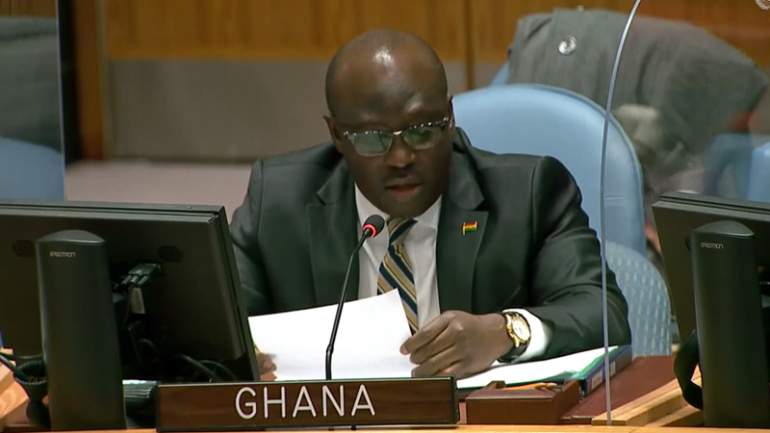UNSC Briefing on Ukraine (Implementation of the Minsk Agreements)

Mr. President,
I would like to thank USG Rosemary DiCarlo for her briefing on the prevailing security and humanitarian situation in eastern Ukraine. My delegation is also grateful to Mr. Mikko Kinnunen, the Special Representative of the OSCE Chairperson-in-Office in Ukraine and the Trilateral Contact Group and Mr. Yaşar Halit Çervik, Chief Monitor of the OSCE Special Monitoring Mission in Ukraine for highlighting the efforts of the OSCE in facilitating the political and diplomatic settlement of the conflict in eastern Ukraine. We also appreciate the views expressed by Ms. Tetiana Montian from the Ukrainian civil society.
May I further acknowledge the presence of H. E. James Cleverly (Minister of State for Europe and North America) of the United Kingdom and welcome also the participation of the representatives of Germany and Ukraine in this meeting.
Mr. President,
In welcoming today’s discussions, which enable the Council to take stock of the “Package of Measures for the Implementation of the Minsk Agreements” adopted on 12th February 2015 in Minsk, my delegation recalls the adoption of resolution 2202, wherein the Security Council expressed its firm conviction that the crisis in the eastern regions of Ukraine could only be settled through peaceful means.
Seven years after adoption of resolution 2202, the Council’s obligation for the maintenance of international peace and security, requires of it, a reiteration of its conviction and support for the processes for the further implementation of the Minsk Agreements.
Unfortunately, the Minsk Agreements remains largely unimplemented, and the conflict continues to fester in parts of the Donbas region, with increasing civilian casualties and deepening vulnerabilities, mostly of elderly persons and women-led households. More than 14,000 deaths have been recorded since the conflict in eastern Ukraine begun, several thousands of people have been displaced, and 2.9 million people are presently in need of humanitarian assistance. The implications of the situation in Ukraine on regional as well as international peace and security have also been dire.
Mr. President,
While recognizing the complex fears and complicated concerns which have been expressed by the parties through the Minks Agreements, we nonetheless believe that good faith conformity with existing Charter obligations by concerned Member States should provide clarity to seize the opportunities for supporting continuing dialogue and the engagements required to address the concerns of all parties.
In this respect, Ghana is concerned by the increasing tensions along the borders of Ukraine. We recall the provisions of the Charter, which establishes the fundamental norms of the post-1945 international order and require that the international relations of Member States should not involve threats of or use of force against the territorial integrity or political independence of other States. We therefore entreat all parties to maintain the path of dialogue and diplomacy in addressing any differences that may exist between and among them, including with Member States.
Towards the further implementation of peaceful measures for resolving the crisis in the eastern regions of Ukraine, we wish to make the following points:
(a) First, Ghana reaffirms her support for the sovereignty and territorial integrity of Ukraine, a bona fide Member State of the United Nations, whose membership of this Organization provides for her guarantees over her internationally recognized borders.
(b) Secondly, we note the security concerns of other Member States in Europe, especially those in Eastern Europe and urge restraint by all in maintaining the pacific order in Europe, even as efforts continue to address any concerns with contemporary European security architecture.
(c) Third, we welcome the high-level diplomatic engagements to address existing concerns over the situation in Ukraine, including recent discussions among leaders of the Normandy Four that reaffirmed the ceasefire in the eastern region of Ukraine as well as the OSCE-facilitated dialogues at different levels. We continue to urge restraint by all sides, call on the parties to bear in mind the prospective outcomes which do not lead to a strategic gain for any party, and encourage efforts to address both immediate and long-term interests through diplomacy and dialogue.
(c) Fourth, we urge renewed dialogue within the Normandy Four process to resolve differences in the interpretation of the sequencing of the “Package of Measures for the Implementation of the Minsk Agreements”. As it is said “How can two go on a journey unless they be agreed on the path they intend to take?”.
(d) Fifth, we urge the parties to guarantee unimpeded access for humanitarian assistance in both government and non-government-controlled areas in line with humanitarian principles and international humanitarian law. We further commend the efforts of humanitarian agencies in Ukraine and welcome the 2022 Humanitarian Response Plan to save lives, ensure access to basic services, and strengthen the protection of those affected by the conflict and COVID-19.
Finally, Mr. President, let me conclude by stressing Ghana’s support for the renewal of the spirit of the Minsk Agreements. We urge the parties to work in good faith and with flexibility to make necessary concessions for an enduring peace in Ukraine with beneficial outcomes for the rest of Europe.
I thank you, Mr. President.
